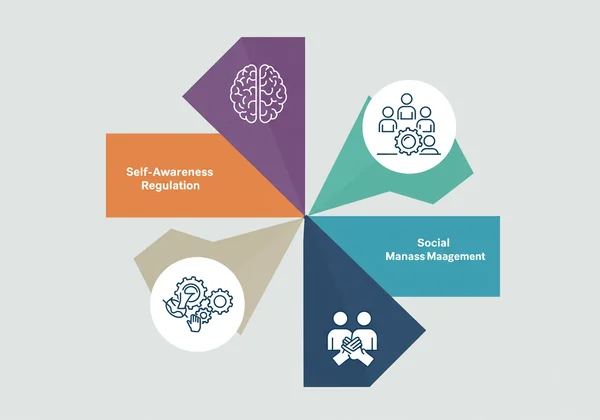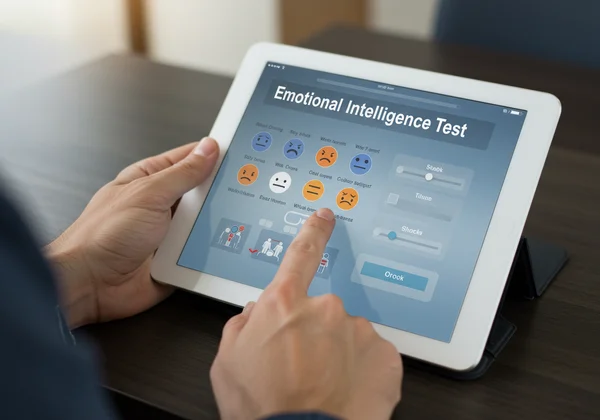12 Signs of High EI: Cultivate Your Emotional Intelligence
October 27, 2025 | By Evelyn Reed
Have you ever wondered what makes some people seem to effortlessly navigate social situations, manage stress, and inspire others? The answer often lies in their high emotional intelligence (EI). But what are signs of high emotional intelligence? This quality is not an innate gift reserved for a select few; it is a set of skills that can be learned and cultivated. This article will unveil 12 powerful signs that indicate a high EI and, more importantly, provide actionable steps to develop these vital traits in yourself. Understanding and enhancing your EI can transform your personal and professional life, and the first step is knowing where you stand. You can get a clear baseline by taking a free EI test.

What are High EQ Traits? Understanding the Core Pillars
Before we dive into the specific signs, it's essential to understand the foundation of emotional intelligence, often referred to as EQ. These skills are typically organized into four core pillars that work together, creating a holistic ability to perceive, use, understand, and manage emotions. Recognizing these pillars helps contextualize the specific behaviors associated with high EI.
The Foundation: Self-Awareness & Self-Regulation in EI
Everything starts from within. Self-awareness is the cornerstone of emotional intelligence—it’s the ability to accurately recognize your own emotions, strengths, and limitations. It’s about knowing how your feelings affect your thoughts and behavior. Following closely is self-regulation, which is the ability to manage your emotional reactions. It's not about suppressing feelings, but rather about responding to them in a measured and constructive way, allowing you to stay flexible and adapt to changing situations.
Navigating Social Worlds: Social Awareness & Relationship Management
Once you understand yourself, you can better understand others. Social awareness, particularly empathy, is the ability to pick up on the emotions of other people and understand what they might be thinking or feeling. It involves recognizing social cues and power dynamics within a group. Finally, relationship management is the culmination of the other three pillars. It’s about using your awareness of your own emotions and those of others to manage interactions successfully, inspire and influence others, manage conflict, and work well in a team.

12 Powerful Signs of High Emotional Intelligence in Action
People with high EI demonstrate specific behaviors that reflect their mastery of the four pillars. Here are 12 clear signs you can look for in yourself and others. These emotional intelligence examples showcase what high EQ looks like in the real world.
1. You Have a Rich Emotional Vocabulary
You don't just feel "bad"; you can pinpoint whether you're feeling frustrated, anxious, disappointed, or resentful. The ability to identify and label emotions accurately is a hallmark of self-awareness.
2. You Know Your Strengths and Weaknesses
You are honest with yourself about what you excel at and where you struggle. This isn't about harsh self-criticism but about a clear-eyed view that allows you to leverage your strengths and seek help when needed.
3. You Practice Self-Compassion
Instead of beating yourself up for mistakes, you treat yourself with kindness and understanding. You recognize that imperfection is part of the human experience, which fuels resilience rather than shame.
4. You Manage Your Reactions Effectively
When faced with a stressful situation, you can pause before reacting. This emotional control allows you to think clearly and avoid making impulsive decisions you might later regret.
5. You Are Highly Adaptable
Change doesn't throw you off balance. Whether it’s a new project at work or an unexpected life event, you can adjust your strategy and maintain a positive outlook. This flexibility is a key aspect of self-regulation.
6. You Follow Through on Commitments
Your conscientiousness and reliability build trust. People know they can count on you because you align your actions with your words, a skill rooted in managing your own impulses and motivations.
7. You Are Genuinely Curious About Others
You listen more than you speak and ask thoughtful questions because you truly want to understand other people's perspectives. This curiosity is the engine of empathy and a powerful tool for connection.
8. You Can Read a Room
You have strong social awareness. You can sense the emotional climate of a group and understand unspoken dynamics, allowing you to navigate social situations with grace and effectiveness.
9. You Give and Receive Feedback Gracefully
You can offer constructive criticism without causing offense and accept it without becoming defensive. You see feedback as a valuable tool for growth, not a personal attack.
10. You Are Adept at Managing Conflict
You don't shy away from disagreements. Instead, you approach them with the goal of finding a mutually beneficial resolution, using your empathy and communication skills to de-escalate tension.
11. You Inspire and Influence Others
Your passion is contagious, and you can articulate a vision in a way that motivates people to act. This leadership quality stems from a deep understanding of what drives and inspires others.
12. You Build Strong, Positive Connections
Ultimately, high EI enables you to foster deep, meaningful relationships. You invest time and energy in building a strong support network based on trust, respect, and mutual understanding. Ready to see which of these strengths you possess? An online EI test can provide a structured overview.

How to Cultivate High EI: Practical Steps for Lifelong Growth
Recognizing the signs is the first step; actively cultivating them is the journey. Emotional intelligence is not a fixed trait. With intentional practice, anyone can improve. Learning how to get high eq is a process of developing new habits.
Daily Practices for Boosting Your Self-Awareness
Start by checking in with yourself. A simple daily practice is to pause and ask, "What am I feeling right now?" and "Why am I feeling this way?" Journaling can be a powerful tool to explore these questions more deeply. Mindfulness meditation also trains your brain to observe your thoughts and feelings without immediate judgment, which is the essence of self-awareness.
Enhancing Your Empathy and Social Skills
To boost empathy, practice active listening. The next time you're in a conversation, put away distractions and focus completely on what the other person is saying, both verbally and non-verbally. Try to understand their perspective before formulating your response. Challenge yourself to step outside your usual social circle to interact with people from different backgrounds.
Beyond Self-Assessment: Why a Formal EI Test Matters
While self-reflection is crucial, it has its limits. Our own biases can cloud our judgment. This is where a scientifically-grounded assessment provides immense value. A formal EI assessment gives you an objective snapshot of your emotional skills, highlighting your natural strengths and pinpointing specific areas for development. It moves you from guessing to knowing. Our platform offers a comprehensive EI test online designed to provide these actionable insights.

Unlocking Your Full Potential Through EI
The 12 signs of high emotional intelligence paint a picture of a person who is not only in tune with themselves but also with the world around them. These are not magical abilities but a collection of practical skills that power effective leadership, strong relationships, and personal well-being. Cultivating these traits is a lifelong journey of growth that pays dividends in every area of your life.
Self-assessment is a powerful start, but for the deepest, most actionable insights into your unique emotional landscape, a scientifically validated test is invaluable. It provides a clear roadmap for your personal development.
Ready to objectively measure your emotional intelligence and unlock your full potential? Take our free EI test today and get your personalized score!
Frequently Asked Questions About Emotional Intelligence
How do I know if I have high EQ?
You can look for the 12 signs discussed in this article, such as self-awareness, empathy, and effective relationship management. However, the most objective way to understand your emotional intelligence is by taking a structured assessment. An emotional intelligence score can provide a clear and data-driven baseline for your personal growth journey.
What is a good EI score?
A "good" EI score is relative and depends on the specific test's scoring model. More important than a single number is understanding your score profile across different areas of emotional intelligence, such as self-awareness and social management. The goal is not to achieve a perfect score but to identify areas where you can grow. The report from an online emotional intelligence test can help you interpret your results in a meaningful way.
How to improve emotional intelligence?
Improving emotional intelligence is an active process. Start with self-reflection and mindfulness to build self-awareness. Practice active listening and try to see situations from others' perspectives to enhance empathy. For targeted development, use the insights from a professional EI test to create a personal action plan focusing on specific skills.